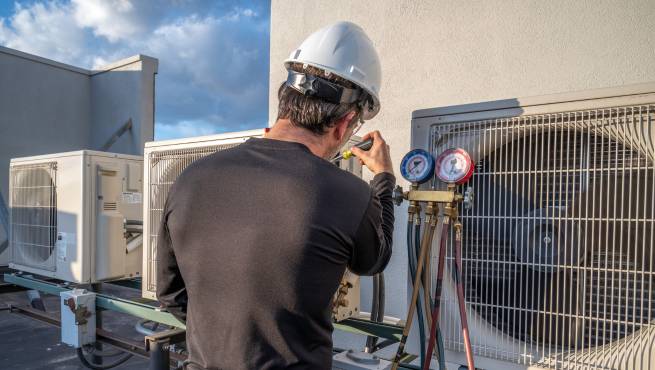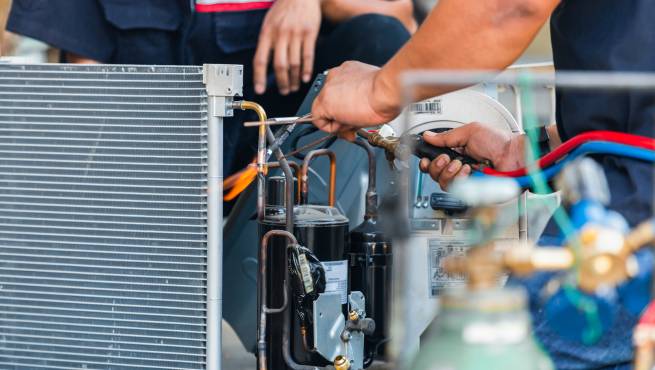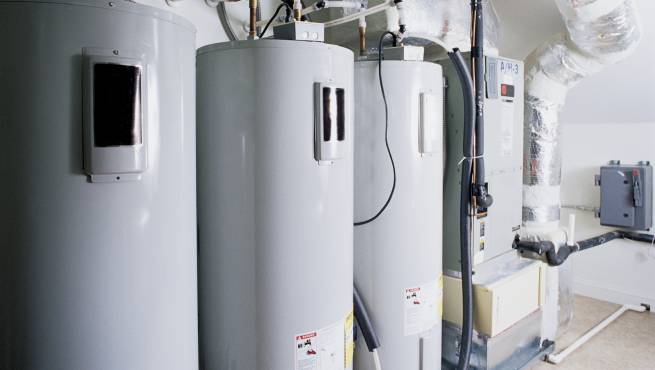Few things are as frustrating as coming home on a sweltering summer day, only to find your air conditioner is pushing out hot air instead of the cool, refreshing breeze you were expecting. If you’ve found yourself wondering, “Why Is My AC Blowing Hot Air?” you’re not alone. This common problem can often be resolved with a little bit of troubleshooting, saving you time and money.
This guide is built to help homeowners and property administrators in Boston understand why their air conditioning units might blow hot air and how to fix it. We’ll walk you through common causes, practical DIY solutions, and when to call a professional for HVAC solutions.
Common Reasons Your AC Might Be Blowing Hot Air
Before you panic or rush to call a technician, it helps to understand why your air conditioner may be malfunctioning. Here are some of the most common culprits behind an AC blowing hot air:
1. Thermostat Issues
The thermostat acts as the command center for your air conditioning system, so any misconfiguration can lead to unwanted outcomes. If it’s accidentally switched to the wrong setting—like heating instead of cooling—it could explain the hot air problem.
Additionally, dead batteries or faulty internal components in the thermostat may also cause this issue.
2. Dirty Air Filters
Air filters trap dirt, dust, and debris to keep the air inside your home clean. Over time, these filters can become clogged, restricting airflow and causing your unit to overheat. When this happens, your AC struggles to cool effectively and may even blow warm air.
3. Refrigerant Leaks
If your AC unit is low on refrigerant—either due to a leak or insufficient levels—it will struggle to cool the air. Refrigerant plays a crucial role in the heat exchange process, so insufficient levels prevent your system from effectively cooling your home.
4. Frozen Evaporator Coils
A frozen evaporator coil might sound counterintuitive, but it’s a common issue. This problem arises when the airflow inside your AC is obstructed (often due to dirty filters or refrigerant issues). The frozen coil reduces your system’s ability to cool and circulate air properly.
5. Obstructed Outdoor Unit
Your outdoor unit (or condenser) is responsible for releasing the heat collected from inside your home. If it’s covered in debris like leaves, dirt, or even vegetation, this process is disrupted, and the system might blow hot air as a result.
6. Electrical Issues
Electrical problems, such as a tripped circuit breaker or blown fuse, can halt critical components like the compressor or outdoor unit fan. Without these functioning correctly, your AC can’t cool air effectively.
7. Lack of Routine Maintenance
Without regular check-ups, small issues can escalate over time. Dirty coils, blocked vents, and other neglected parts of the system can lead to an AC failing to perform its job.
DIY Troubleshooting Tips to Restore Cool Airflow
The good news? You can often resolve hot air issues yourself with a few simple steps. Here are some practical DIY solutions to get your AC back up and running:
1. Double-Check the Thermostat Settings
Ensure your thermostat is set to “Cool” mode and that the temperature is lower than the current room temperature. Replace dead batteries if necessary, and verify the fan setting isn’t mistakenly on “On” rather than “Auto.” The “On” setting may cause the fan to blow constantly, even when it’s not actively cooling.
2. Inspect and Replace Air Filters
Check the condition of your air filters. If they’re dirty, replace them with a new filter and make it a habit to replace filters at least every 1–3 months. Clean filters don’t just improve airflow; they also enhance indoor air quality.
3. Clear Debris Around the Outdoor Unit
Inspect your outdoor condenser unit to ensure there are no obstructions. Remove leaves, dirt, or other debris and give the area around the unit a thorough cleaning. Leave at least two feet of clearance to allow proper airflow.
4. Check Circuit Breakers and Power Supply
If your AC unit suddenly stops functioning, a tripped breaker or blown fuse could be to blame. Locate your electrical panel and reset a tripped breaker, but if the problem persists, it may indicate a deeper electrical issue requiring professional attention.
5. Thaw Frozen Coils
Turn off your AC if you spot frozen evaporator coils. Allow the coils to thaw completely before turning it back on. To prevent the issue from recurring, ensure proper airflow by replacing clogged filters or clearing vents.
6. Look for Signs of Refrigerant Leaks
If you suspect your system is running low on refrigerant (e.g., weak airflow, hissing noises, or icy coils), it’s best to contact a technician. DIY solutions won’t suffice for fixing refrigerant leaks or recharging your system.
When to Call a Professional for AC Issues
While DIY troubleshooting can resolve many issues, there are times when professional help becomes essential. Here are specific scenarios when you should rely on an expert:
1. Persistent Issues After Troubleshooting
If your AC continues to blow hot air despite performing all the recommended checks, a technician can diagnose complex mechanical or electrical problems that might be affecting your system.
2. Unusual Noises or Smells
Strange sounds, such as grinding, banging, or hissing, as well as unpleasant odors, could indicate serious issues. These might include motor failures, refrigerant leaks, or mold growth in the system.
3. Electrical Problems
Attempting to fix electrical issues yourself can be dangerous. If you suspect a broken capacitor, wiring problem, or damaged components, contact a licensed HVAC professional immediately to ensure safety.
4. Refrigerant Handling
Refrigerant leaks not only compromise your AC’s cooling capabilities but can also pose health and environmental risks. Licensed professionals should address refrigerant-related issues, as they have the tools and expertise to identify and resolve leaks safely.
5. Regular Maintenance Check-Ups
Investing in annual or bi-annual maintenance can help you avoid costly repairs in the long term. Professional maintenance includes cleaning coils, testing components, and ensuring optimal performance.
Proper Maintenance Is Key to Prevent Future Issues
One of the best ways to avoid hot-air issues is through consistent preventative maintenance. Schedule annual tune-ups with a trusted HVAC company to keep your unit running efficiently all year long. Routine care ensures small problems are caught before they turn into costly repairs or breakdowns right when you need your AC the most.
Don’t wait for the next heatwave to realize your AC is underperforming. Be proactive with regular maintenance and enjoy peace of mind knowing your home will stay cool and comfortable.
At JCShuman, we provide expert solutions for all your heating and air conditioning needs. Our skilled team is equipped to handle a wide range of HVAC issues, ensuring your system operates efficiently and reliably.




